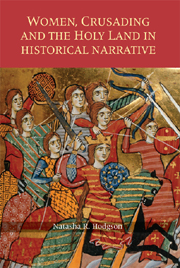4 - Daughters
from PART II
Published online by Cambridge University Press: 12 September 2012
Summary
Daughters and Medieval Society
THE aristocratic focus of crusade narratives made it inevitable that evidence about daughters was heavily weighted towards the lineage, inheritance and betrothal of young noblewomen. To a lesser extent, their character and training were also discussed. This chapter will centre predominantly on unmarried aristocratic daughters, but heiresses will be discussed both before and after wedlock in matters pertaining to their birthright. Dowry was critical to a woman's social position and will be considered here in reference to the negotiations preceding marriage, although it will also feature in later chapters on wives and widows. Sexual status was also a measure of daughterhood – the term virgines was sometimes used to describe young unmarried women instead of filiae or puellae. This term could also apply to celibate women of any age, however. Many entered convents after married life and were not technically virgins, but as Wogan-Browne remarks, ‘the relations between “technical” and “spiritual” virginity are constantly and revealingly negotiable’. Women religious will be discussed here in relation to the issue of virginity because of its association with daughterhood, but those who were known to have entered monasteries after marriage will be considered in the relevant chapters. The following section will briefly explore the traditional views about daughters which medieval authors drew from classical and biblical writings, as well as the social conventions that influenced them during the time of the crusades. To begin, some of the general historiographical problems raised by the study of childhood and the life-cycle stage of daughterhood must be considered.
- Type
- Chapter
- Information
- Women, Crusading and the Holy Land in Historical Narrative , pp. 54 - 102Publisher: Boydell & BrewerPrint publication year: 2007



